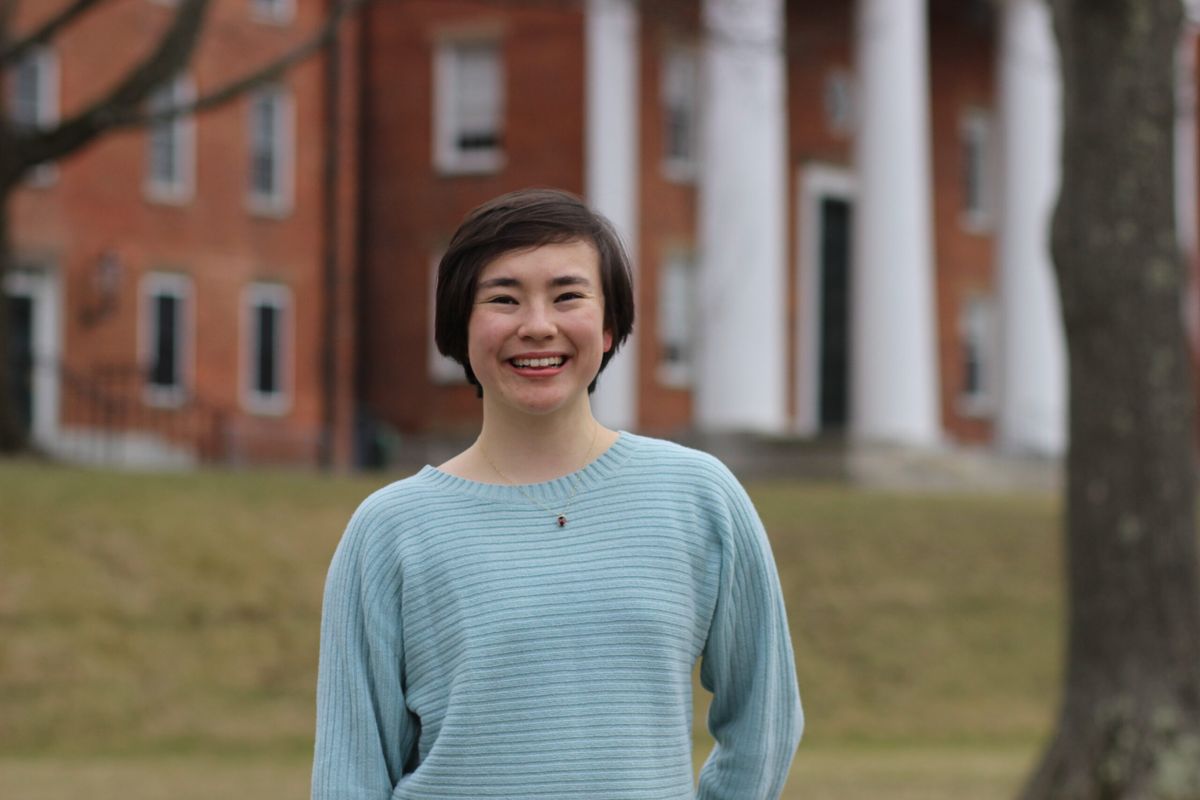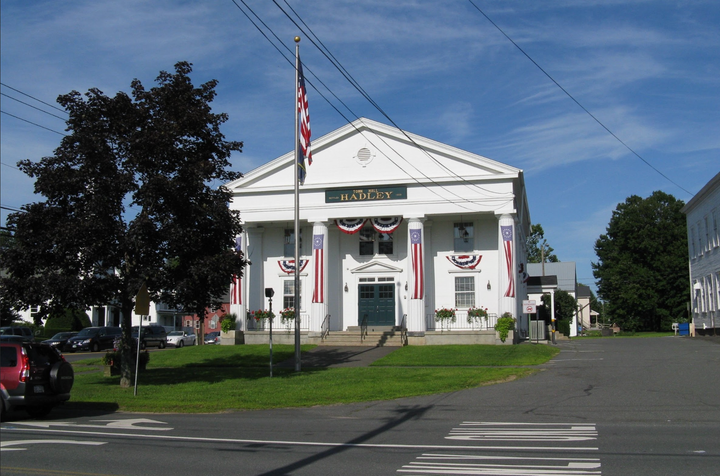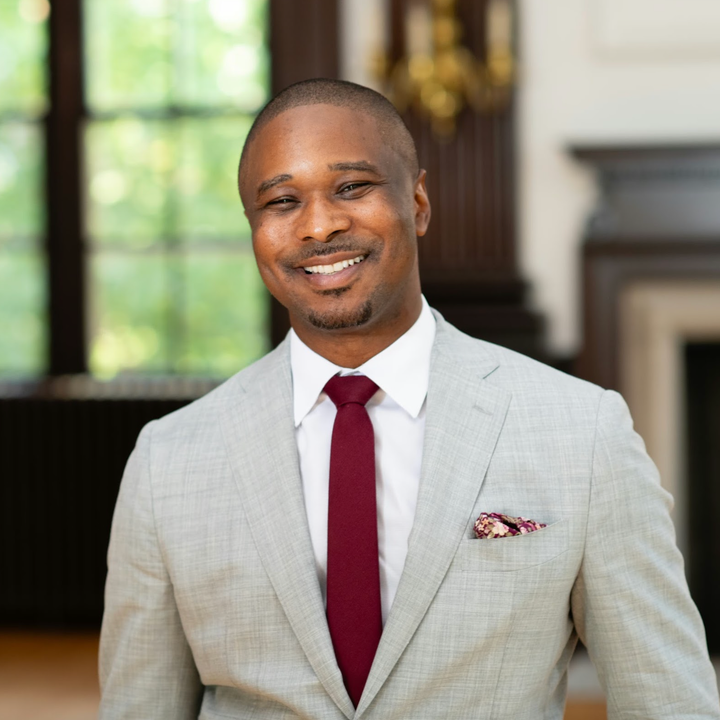Math, With a Minor in Talking

Coming from a small public school in Brookline, a modest town on the outskirts of Boston, Kate Finnerty ’19 has emerged as a quiet and humble leader at Amherst, who, despite their own humility, has managed to leave a mark on campus and on the school’s community.
Before arriving at Amherst, Finnerty said that they wanted to go to a small, liberal arts school, applying to “anywhere but Williams.”
“My dad and my aunt went here, and I wasn’t completely set on coming to Amherst, but when I got in and visited again, it felt like a place that I wanted to spend four years.”
Finnerty demurred, “When they do the class of 20-whatever statistics, there’s always that person who has done something absolutely crazy; I was never like that.”
Finnerty moved into the fourth floor of Charles Pratt Dormitory and settled into their courses, but said, “Talking about my first year would be incomplete without talking about how I came out as non-binary. I think, personally, that has been a huge thing for me to think about.”
Finnerty continued, “The first time I came out to a big group of people was the spring of my first year. Having a more honest understanding of myself has helped me be more patient and kind to myself.”
A Transforming Relationship With Math Finnerty knew coming into Amherst that math was one of their long-term interests. “I had made a point of exhausting all the math classes in high school,” Finnerty laughed, and continued, “Not to mislead, I know some people come in having done multi[variable calculus], but I had just taken calculus by the time I got here!”
“But coming into Amherst and math, I instantly felt welcomed, despite the 9 a.m. class that was not particularly fun,” they added.
As Finnerty continued through the major, they felt themself becoming more and more interested in pursuing math. However, Finnerty’s “reason for pursuing math has changed over my time at Amherst in that, at first, I liked it just because the way everything fit together and built off of what you’ve done before made sense to me and was really appealing because it felt like pieces of a puzzle fitting together, advancing you further from what you had done before.
Now, though, after having taken more of the upper-level courses, the more creative aspect of it has begun to be more important and more interesting to me.”
This was a function, according to Finnerty, of studying math at a liberal arts college, where professors, rather than teaching to a solution, are willing to sit down and discuss math. “It becomes more of a collaboration,” they said.
Finnerty said that this radical transition occurred when they took discrete mathematics, a class where math became “less about ‘solve this,’ and more about ‘prove this.’ This is more satisfying to me, because it feels like you’re doing something, solving something, originally for the first time.
Colin Murphy ’21 commented on Finnerty’s love for math and passion for the process, saying “Kate was my TA [teaching assistant] for a math course I took, and they were willing to spend as much time as it took to explain any concept to me and anyone else who would go. It was clear that they had a passion for the subject.”
It was this passion for higher-level math and individual problem-solving that moved Finnerty toward writing a thesis titled “Representability of Primes as Sums of Squares: An Introduction to Class Field Theory.”
Writing a math thesis starts during the fall of the student’s junior year when they register for the honors-qualifying exam, the equivalent of comprehensive exams, albeit with greater difficulty and more subjects included.
“In January, I spent half the time applying for jobs and the other half studying for this exam,” they said. “Thankfully, I qualified, and I had the opportunity to talk to a bunch of different professors about the thesis-writing process and what I could potentially work on.”
For their thesis, Finnerty expanded on a previous project, attempting to generalize a phenomenon they had observed in a previous course.
“As a weird coincidence, my advisor, Professor [of Mathematics Harris] Daniels, had a copy of a book written by Professor [of Mathematicss David] Cox that answered a question similar to the one I was asking,” they said.
“My major advisor went on sabbatical, and I showed up in the fall, and Professor Cox was randomly assigned as my advisor for the year. I showed up in the fall, and he asked what I was doing my thesis on,” Finnerty laughed. “So I had to turn right around and say, ‘Your book!’”
Finnerty recently defended their thesis, and was recommended for summa cum laude honors by the math department.
Moving Beyond Mathematics Math was not the only academic focus that Finnerty explored during their time at Amherst. In addition to being a math major and writing a math thesis, they were an Asian languages and civilizations major.
On their decision to double major, Finnerty said, “I kind of just wanted to mix up the type of work that I was doing, largely because the thought of having four different problem sets to do per week was extremely unappealing.”
They continued, “I had also taken Mandarin in high school, and it felt like a shame to waste all that knowledge. Also, I realized that after taking Mandarin here at Amherst, I was halfway done with the major, so I figured, why not just finish it out?”
“I feel like if you’re at Amherst, you might as well do some reading and stuff that you normally wouldn’t do in your major or majors, so Asian languages and civilization was definitely a part of that,” they added. “I also made a point of taking one completely random class per semester, which has been great.”
An Extracurricular in Talking Finnerty supplemented their impressive work in the classroom with a bevy of extracurricular activities, including serving as a coxswain on the crew team and as a lawyer on the competitive mock trial team.
“I often like to joke that my main extracurricular activity is talking. Between being a coxswain on the crew team and being a lawyer, all I do is talk!” Finnerty exclaimed.
Rowing before high school gave Finnerty the background requisite for their immediate success on Amherst’s crew team.
Despite stroking their high school’s second and third varsity boats, Finnerty became a coxswain on Amherst’s team, leading the second varsity boat for the Mammoths. They eventually came to coxswain for the team’s first varsity boat.
Remarking on their experience with the crew team, Finnerty said, “Once you’re in the team, you notice that it’s such an intense investment, not just of time, but of mental and physical energy. You’re practicing in all sorts of conditions, you’re physically suffering if you’re rowing and, honestly, at least recently, we haven’t won a lot.”
“You ask yourself, ‘Why am I doing this?’ and for me I found that there was something more in it than just the result,” they said. “That this is something worth investing in and buying into is something that I believe in.”
Crew forced them to “do things and have experiences that I never would voluntarily do otherwise,” they said.
“I can remember one practice this year where it was pouring rain, and I was sitting in two inches of water in the coxswain’s seat, and you start to wonder about the virtue of suffering in the rain,” Finnerty said. “Maybe I’m a little crazy or irrational, but there is the feeling of knowing that, once it’s over, you and your teammates have now done that together.”
 In addition to their role as a lawyer on the mock trial team, Finnerty is a coxswain for the first varsity boat on the crew team. Here, they are pictured with four of their teammates after the 2019 New England Championships. Photo courtesy of Kate Finnerty ’19.
In addition to their role as a lawyer on the mock trial team, Finnerty is a coxswain for the first varsity boat on the crew team. Here, they are pictured with four of their teammates after the 2019 New England Championships. Photo courtesy of Kate Finnerty ’19.
Head coach Bill Stekl remarked on Finnerty’s contribution to the team, stating, “Kate brought a level of professionalism, enthusiasm and willingness to suffer that has been unique in both its intensity and consistency over their time on the team.”
“Be it mentoring other coxswains or just bringing focus to every practice and race, Kate has been an invaluable member of the team from the moment they stepped on campus,” Stekl added.
Amalia Cruz ’19, one of Finnerty’s friends and fellow coxswains, said, “Kate taught me everything that I know about being a coxswain. I have so much respect for their work and ability, and it really has been fun getting to be teammates alongside them for these last four years.”
In addition to their efforts as a member of the rowing team, Finnerty took the reins for the mock trial team. “Mock trial increased my confidence a lot, both in terms of being a leader, interacting with people in a more formal way, and the fact that this group of people is really dedicated, driven and special,” Finnerty said.
Deciding on a Future After college, Finnerty will be working for a consumer packaged goods consulting firm, the same firm at which they had previously held a summer internship.
Finnerty was drawn to the work because it “seemed like something very concrete, the things that you’re working with are really everyday things. So, I just decided to go for it, and I was shocked that I got it, but I loved my experience as an intern and the work because it sits right in that sweet spot between mathematics and creativity.”
Their long-term plan is as of yet undefined. No matter the course, what is guaranteed is that Finnerty will bring their unique perspectives and intellectual curiosity to bear on future work.
“I think one of the things that I learned at Amherst is that the thing that you do right out of college is usually not the thing that you do forever,” they said. “I’m excited to find out what I want to do long-term, and I am confident that eventually I will find somewhere that I feel like I’m doing something meaningful with my life.”




Comments ()